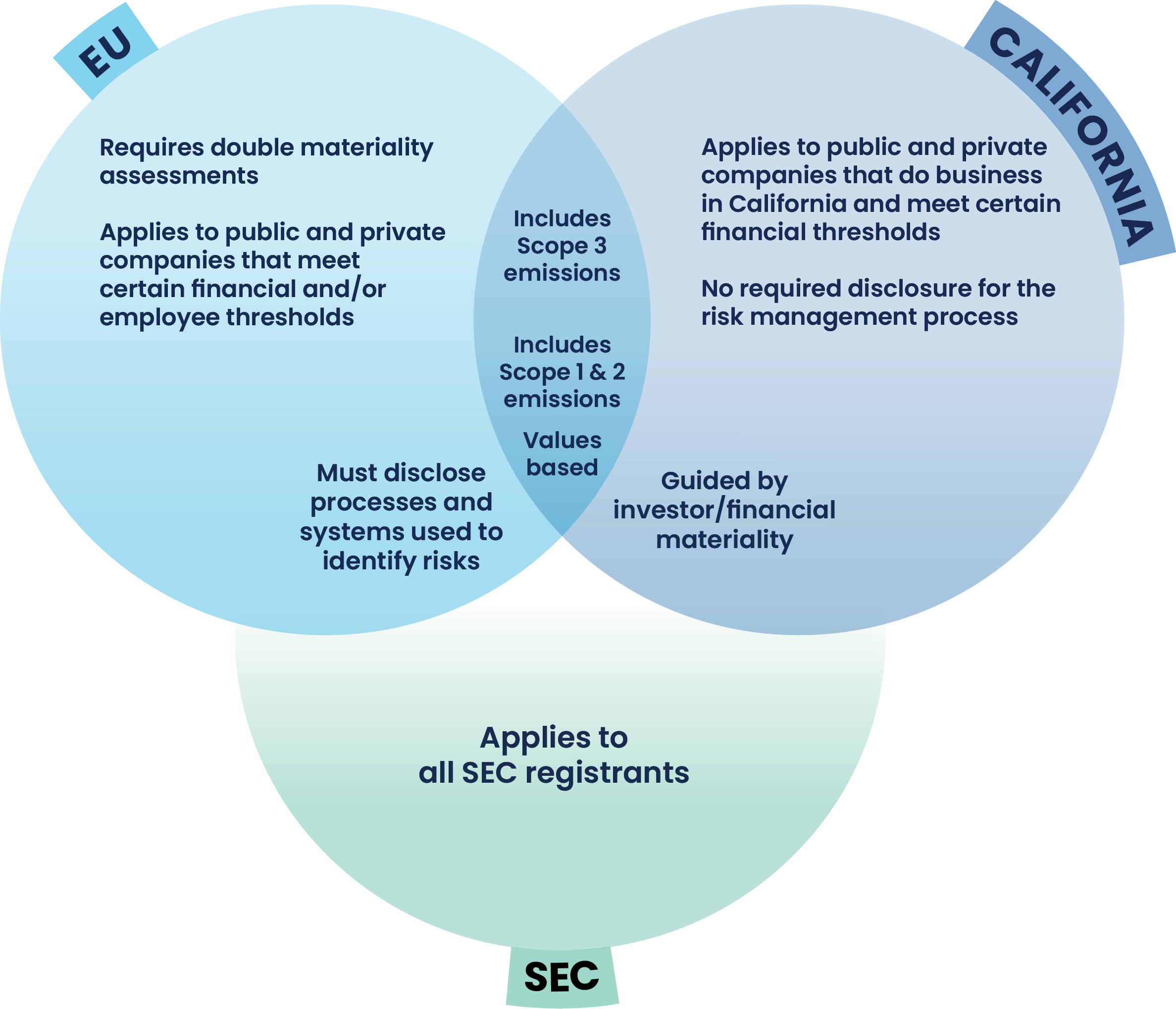Share this
by Laura Richards on April 24, 2024
By now, you probably know that ESG requirements are no longer a discussion but a reality for the commercial real estate industry.
Have you wondered how Environmental, Social and Governance will actually impact your company? The European Union, SEC and the state of California have established their own corporate sustainability reporting standards — the “E” part of ESG.
If your organization operates in markets governed by these bodies, let’s make sure you have the clarity and guidance to comply with these ESG disclosure and accounting standards.

CoStar President comments on ESG & CRE
Read more from Mark McDonald
How the EU is taking on ESG requirements
The European Union has been at the forefront of ESG regulation. Starting with regulatory requirements like the EU Sustainable Finance Disclosure Regulation (SFDR) and the EU Taxonomy Regulation. These require companies to complete ESG real estate disclosures, classify economic activities based on their sustainability and consider ESG factors into their investment decisions.
The SFDR mandates disclosure of ESG information in pre-contractual documents, websites and periodic reports. The goal is to significantly enhance transparency and comparability for investors at every stage of a transaction.
Companies operating in the EU know that compliance with these regulations is essential. They also know they need to evaluate the sustainability of their operations. Failure to comply could result in damage to their reputations, regulatory penalties or loss of investor trust.
How California is taking on ESG requirements
With two major pieces of climate legislation, California stands out as a pioneer in ESG regulation at the state level in the United States.
The Climate Corporate Data Accountability Act (SB 253) will require public and private businesses that operate in California and have over $1 billion in revenue to report their scopes 1, 2 and 3 emissions.
The Climate-Related Financial Risk Act (SB 261) requires that large corporations prepare and submit an annual report disclosing their climate-related financial risks and the measures they're taking to mitigate them. The revenue threshold for SB 261 is a little lower — companies only need to make $500 million to be included.
Companies doing business in California should and are now building their teams to include ESG-related skill sets. When they do so, they can better navigate sustainability challenges, anticipate regulatory developments and enhance stakeholder engagement. Especially for employees who are among the most passionate about a company’s environmental impact.
How the SEC is taking on ESG requirements
The SEC's ruling in March 2024 was a significant milestone in the United States' approach to environmental regulation.
The ruling requires publicly-traded companies to disclose certain ESG metrics and risks. These metrics must be in their annual reports, proxy statements and registration statements. This initiative aims to provide investors with consistent, reliable and comparable ESG information to inform their investment decisions effectively.
The main distinction here is the focus on investments and investors versus the EU’s emphasis on all stakeholders.
Compliance for affected companies means integrating ESG considerations into their disclosure practices. They also will need to immediately begin establishing robust data reporting mechanisms and addressing material ESG risks and opportunities.
By meeting these requirements, companies can enhance transparency, build investor confidence and bake resilience into their everyday business practices.
How the EU, California and the SEC Requirements Intersect
Before the three policies discussed here, there was the Task Force on Climate-Related Disclosures (TCFD). The TCFD was formed as a response to the failings of the 2015 Paris Agreement. It was established by G20 and the Financial Stability Board (FSB).
The SEC, EU and ISSB policies - as well as other climate disclosures around the world - are based on the TCFD framework's 11 disclosures. As other governing bodies create their own climate disclosure requirements, the TCFD will likely influence them to some degree.
The main connecting thread between the SEC, EU and California requirements is their structure around values. All three emphasize transparency, accountability and sustainability.
This shift towards corporate responsibility is gaining momentum worldwide. Organizations that embrace ESG reporting with enthusiasm will see a lot of upsides. They can mitigate risks, enhance their competitiveness in their markets and contribute to a more sustainable global economy.

How the EU, California and the SEC requirements diverge
The biggest difference between the three ESG frameworks is the inclusion of Scope 3 emissions. You may have heard these called by their other name - greenhouse gas or GHG emissions. The EU, California and the ISSB all require the disclosure of Scope 3 emissions. The SEC only requires disclosure of Scopes 1 and 2.
The treatment and definition of materiality are also significantly different between the three. Investor/financial materiality guides the SEC and California rules. This means they only need to disclose factors that will affect a company's performance or decision-making.
In the EU, companies must undertake a double materiality assessment. These organizations will have to disclose intel that impacts their business, society or environment regardless of the positive or negative effect on the company's financials. The focus is heavily on carbon emissions and climate-related risks in the long term.
"That may not be the case for long," says Kent Carpenter, Senior Technical Product Manager at CoStar Real Estate Manager, when asked about the SEC and California treatment of materiality.
"Several countries are electing to consider this concept of double materiality: for example, the UK, Canada and Switzerland. The scope of the EU's Non-Financial Reporting Directive (NFRD) is also planning to expand along with its conversion to the Corporate Sustainability Reporting Directive (CSRD). The CSRD casts a much broader net."
Free eBook: The growing importance of ESG data reporting
Read more from Kent Carpenter
How the rest of the world is taking on ESG requirements
Australia, Hong Kong, Singapore and the United Kingdom have begun developing their own ESG legislation. The universal goal is to integrate the International Sustainability Standard Board’s (ISSB) climate-related disclosure framework (IFRS S1 and IFRS S2).
How you can capture ESG data
Reporting on ESG performance requires the same analytical skills needed for lease accounting. You must collect high-quality, auditable ESG data.
If you're in commercial real estate, you already know that CoStar is the last word in market data. With lease administration from CoStar Real Estate Manager, you can capture ESG data with precision and organization. Learn more.
Share this
- Lease Accounting Software (90)
- ASC 842 (83)
- Accounting Teams (53)
- Lease Administration Software (27)
- Retail Tenants (16)
- Commercial Real Estate (14)
- Lease Management (13)
- Real Estate Teams (10)
- ESG (8)
- Market Data and Analytics (8)
- Success Stories (8)
- News and Media Coverage (5)
- Transaction Management Software (2)
- frs 102 (2)
- Customer Success (1)
- Office Tenants (1)
- December 2025 (1)
- September 2025 (1)
- July 2025 (2)
- June 2025 (4)
- May 2025 (2)
- April 2025 (2)
- March 2025 (6)
- February 2025 (3)
- January 2025 (4)
- December 2024 (1)
- October 2024 (4)
- September 2024 (2)
- August 2024 (4)
- July 2024 (3)
- June 2024 (3)
- May 2024 (4)
- April 2024 (1)
- February 2024 (1)
- December 2023 (4)
- November 2023 (6)
- October 2023 (4)
- September 2023 (2)
- August 2023 (2)
- July 2023 (3)
- May 2023 (2)
- March 2023 (1)
- February 2023 (3)
- January 2023 (1)
- December 2022 (3)
- November 2022 (4)
- October 2022 (4)
- September 2022 (1)
- August 2022 (4)
- June 2022 (1)
- May 2022 (4)
- April 2022 (8)
- March 2022 (3)
- February 2022 (1)
- January 2022 (2)
- November 2021 (2)
- October 2021 (2)
- September 2021 (3)
- August 2021 (15)
- July 2021 (3)
- June 2021 (1)
- May 2021 (1)
- April 2021 (3)
- March 2021 (1)
- January 2021 (1)
- December 2020 (3)
- November 2020 (1)
- October 2020 (2)
- September 2020 (2)
- August 2020 (3)
- July 2020 (2)
- June 2020 (3)
- May 2020 (1)
- April 2020 (1)
- March 2020 (1)
- February 2020 (1)
- December 2019 (1)
- October 2019 (1)
- September 2019 (2)
- August 2019 (3)
- July 2019 (2)
- April 2019 (69)
- October 2018 (1)
- August 2018 (1)
- July 2018 (1)
- June 2018 (1)
- May 2018 (1)
- April 2018 (2)
- March 2018 (3)
- February 2018 (2)
- December 2017 (1)
- August 2017 (3)
- June 2017 (2)
- May 2017 (2)
- April 2017 (1)
- March 2017 (2)
- January 2017 (2)
- November 2016 (2)
- July 2016 (1)
- June 2016 (1)
- July 2015 (1)
- March 2015 (1)
- June 2014 (1)
- April 2014 (11)
- October 2011 (1)
You May Also Like
These Related Stories

Companies are Feeling the Urgency of ESG Accounting

The Benefits & Challenges of ESG Data Reporting Now




